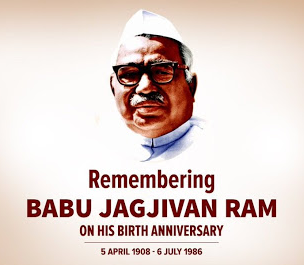Babu Jagjivan Ram | 06 Apr 2021
Why in News
Recently, the Prime Minister paid tributes to freedom fighter and former Deputy Prime Minister Babu Jagjivan Ram on his 113th birth anniversary.
- Jagjivan Ram, popularly known as Babuji, was a national leader, a freedom fighter, a crusader of social justice, a champion of depressed classes and an outstanding Parliamentarian.
Key Points
- Birth:
- Jagjivan Ram was born on 5th April 1908 in Chandwa in Bihar to a Dalit family.
- Early Life and Education:
- He pursued his schooling at the nearby town of Arrah where he faced discrimination for the first time.
- He was considered ‘untouchable’ and had to drink water from a different pot. Jagjivan Ram protested against this by breaking the pot. The principal then had to remove the separate pot from the school.
- In 1925, Jagjivan Ram met scholar Pandit Madan Mohan Malaviya and was greatly inspired by him. On Malaviya’s invitation, he joined the Banaras Hindu University.
- Even at the university, Jagjivan Ram faced discrimination. This inspired him to protest against such social boycotts of a section of society.
- He also organised the scheduled castes to protest against injustice.
- After his stint at BHU, he joined the University of Calcutta from where he secured a B.Sc. degree in 1931.
- Jagjivan Ram had organized a number of Ravidas Sammelans and had celebrated Guru Ravidas Jayanti in different areas of Calcutta (Kolkata).
- He pursued his schooling at the nearby town of Arrah where he faced discrimination for the first time.
- Pre Independence Contributions:
- In 1931, he became a member of the Indian National Congress (Congress Party).
- He was instrumental in the foundation of the All India Depressed Classes League, an organisation dedicated to attaining equality for untouchables, in 1934-35.
- He was a champion of social equality and equal rights for the Depressed Classes.
- In 1935, he proposed at a session of the Hindu Mahasabha that drinking water wells and temples be open to untouchables.
- In 1935, Babuji also appeared before the Hammond Commission at Ranchi and demanded, for the first time, voting rights for the Dalits.
- He was jailed twice in the early 1940s for his political activities associated with the Quit India movement against British rule.
- Post Independence Contributions:
- When Jawaharlal Nehru formed the provisional government, Jagjivan Ram became its youngest minister.
- After independence he held the labour portfolio until 1952. Thereafter he served in Nehru’s cabinet in the posts of minister for communications (1952–56), transport and railways (1956–62), and transport and communications (1962–63).
- He served as minister for food and agriculture (1967–70), and in 1970 he was made minister of defence.
- The Indo-Pakistan War of 1971 was fought when he was the defence minister.
- He left Congress in 1977 and joined the Janata Party alliance, along with his Congress for Democracy (new party). He later served as the Deputy Prime Minister of India (1977–79).
- Jagjivan Ram was a member of the Parliament uninterrupted from 1936 to 1986 (40 years) and this is a world record.
- He also holds another record for being the longest-serving cabinet minister in India (30 years).
- Death:
- He died on 6th July 1986 at New Delhi.
- His memorial at his cremation place is named Samta Sthal (Place of Equality).

